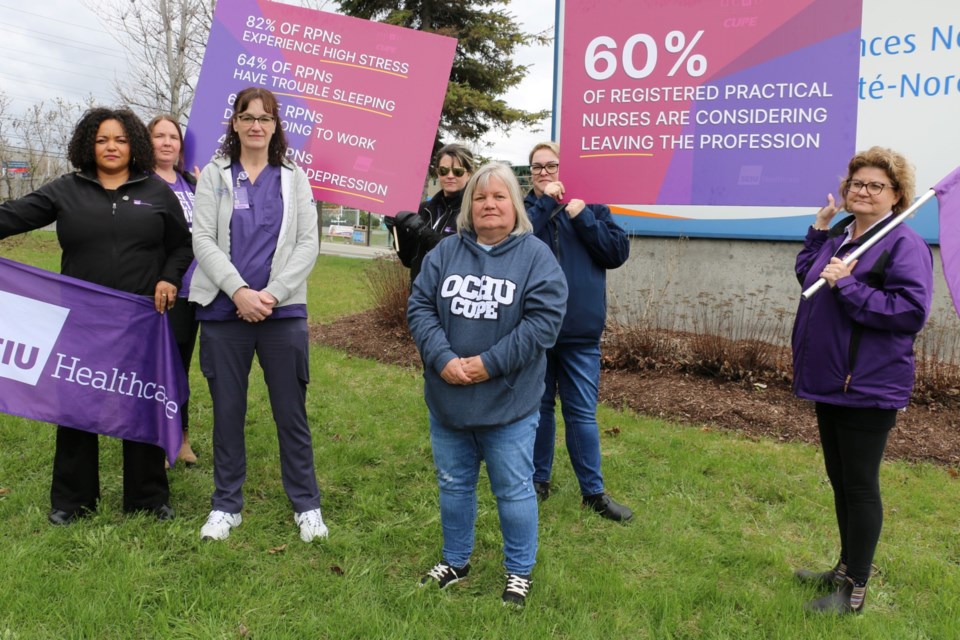Ontario's Registered Practical Nurses (RPNs) believe they are overworked, underpaid and certainly stressed out.
That's according to recent polling carried out by Nanos Research for the Ontario Council of Hospital Unions (OCHU), CUPE (Canadian Union of Public Employees) and the SEIU Healthcare union.
It was the reason that more than 1,000 RPNs were polled just in advance of Nursing Week (May 8-14) , said Sharon Richer, the secretary-treasurer of the Ontario Council of Hospital Unions.
She said the polling showed that more than 60 per cent of the RPNs who responded had considered leaving their jobs.
"And you know, the facts that we actually received under that poll are pretty alarming, particularly here at Health Sciences North, and at the Continuing Care just down the road St. Joe's Continuing Care," said Richer.
She said despite all the reasons for leaving, the RPNs were asked what would make them stay on the job.
She said in many cases, RPNs said they wanted an increase in pay to reflect that 96 per cent of an RPN's duties are the same duties and functions as a Registered Nurse.
In Ontario, RPNs and Registered Nurses (RNs) are both regulated by the College of Nurses of Ontario and both study from the same body of knowledge. RNs study for a longer period of time and are required to have a university-level degree in a discipline focused on nursing. RPNs must take a course approved by the college and achieve a diploma level standard of nursing care.
Richer said RPNs would like to get 70 per cent of an RN's level of pay, which would bring them up to roughly $35 per hour.
"They would think about staying," said Richer. She added that a wage hike might be enough to convince some of the RPNs to work through the stress.
She said another part of the problem is that Ontario Bill 124 put a one per cent per year wage cap on any public sector wage settlements for three years. Richer said the Conservatives under Premier Doug Ford are continuing to fight for Bill 124 although it has already been struck down at one court level.
Richer said the union would also like to see legislated staffing ratios which is done in British Columbia which puts a limit on the number of patients a nurse is responsible for. It would help to ensure that nurses are not overloaded and overworked with a large number of patients.
Also speaking out was Jackie Walker, RPN and nursing division president for SEIU Healthcare. She said one interesting number that came out in the Nanos polling was that 64 per cent — nearly two-thirds — of RPNs do not look forward to going to work each day.
"So imagine having to do all of the critical thinking, and the care work and the emotional work, and just dread being there. So that's a very startling number to us. And it should be to the public too," said Walker. In addition to that, Walker said the polling also showed more than 80 per cent of the workers experienced extreme levels of stress on the job.
"We know that that's not a good working condition for any person, especially people who are caring for vulnerable people."
Walker said another issue is that RPNs are in a regulation health-care profession where they are mandated to carry out a certain standard of care as per their training. She said many RPNs are so overworked they cannot meet the standard.
Moral Injury
"One of the things that the nurses talk about or are starting to talk about is their mental health, and the guilt and the shame that they feel when they leave work, knowing they couldn't do everything that the College of Nurses said to do that the employer policy said to do, so we call that moral injury," said Walker.
Kim Hamilton is an RPN with 30 years of experience who works at Nipissing Manor in Corbeil Ontario. She spoke at the news conference and said the workload can be overwhelming at times, especially when dealing with a large number of patients.
"I've had to give out medications to upwards of 35 people, and if we're working short, there's even more. And then we have residents that could become acutely ill. And you're trying to do an assessment with them; you're trying to deal with not losing focus from giving your medications because that could cause a great error as well," Hamilton explained.
"And you're trying to keep the PSWs (personal support workers) calm if they're coming to you constantly with stuff; you're trying to report to the RN, and you know, it's just a nightmare," she added.
Hamilton said it weighs on them personally because they often wonder if they did enough to keep a patient healthy.
Feel The Guilt
"And you know, some of these people end up becoming critically ill, and perhaps even maybe pass away … and then afterwards, you just feel like it was your fault. Because you didn't do enough. Couldn't do enough. But you actually did do your due diligence. But you still,... you still feel that guilt and the weight of that."
While the rally and news conference was held in Sudbury, SEIU rep Walker said it is not just a Northern Ontario issue. She said the concern with overworked healthcare professionals is a province-wide issue and needs more attention.
Len Gillis covers mining and health care for Sudbury.com.
